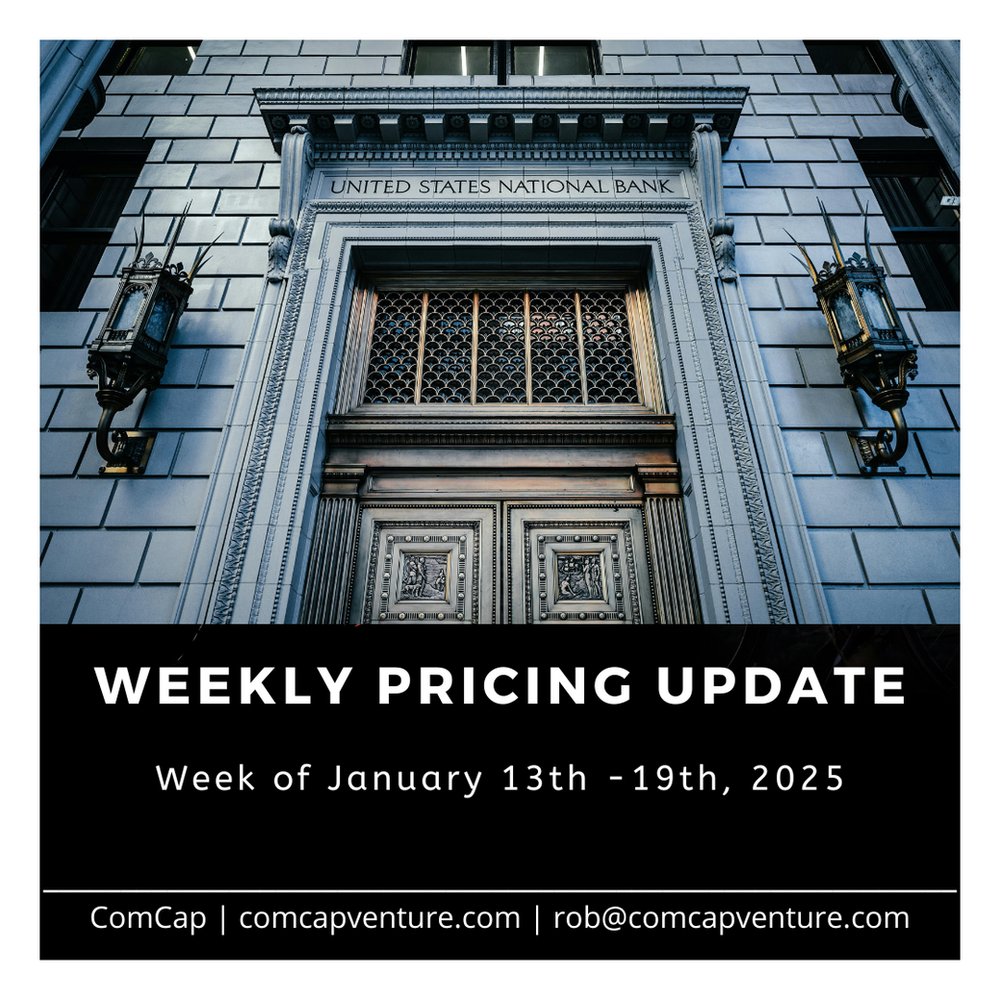(Call or Text)
Headquarted in Massachusetts
Serving Markets Nationally
This Week's Small Business Outlook

Small Business Outlook for the week of 12/9/2024 - 12/15/2024.
Small business optimism is surging post-election, and Main Street employers are bullish on growth even while expecting higher prices for supplies and employees.
Our weekly survey and analysis of the latest data from leading organizations includes NFIB’s jobs report, a small business survey from Nerd Wallet, FiServ’s sales report, and CNBC’s quarterly small business survey with SurveyMonkey.
Our survey about small businesses also reveals optimism about the economy coupled with inflation worries, ongoing hiring pressures and an upward trend in capital spending.
Meanwhile, the Q3 MetLife & U.S. Chamber of Commerce Small Business Index is out with insights on the economy. And our Impact of Technology on U.S. Small Business report shows how AI is helping small businesses.
This Week's Highlights
-
Main Street employers expect to increase staff in the next three months and acknowledge that salaries for talent continue to rise.
-
The new business surge continued throughout 2024, with entrepreneurs pushing for more customers and motivated by income and control over their own schedule
-
The post-election bump shows Main Street employers expecting to add staff and increase revenue at the same time they are expecting higher prices.
-
New Small Business Data
National Federation of Independent Business (NFIB) Jobs Report (December 5, 2024)
Summary: Small employers expect to pay more for talent and are still bullish on hiring.
-
36% of small businesses reported job openings they could not fill in November (1 point higher than October).
-
55% of small businesses hired or tried to hire in November (2 points higher than October). Of those hiring, 87% of those hiring reported few or no qualified job applicants (no change).
-
18% of small business owners are planning to create new jobs in the next 3-months (3 points higher than October).
-
32% of small businesses raised wages in November (up 1 point from October) and 28% plan on raising compensation in the next 3 months (up 5 points from October).
-
30% of small businesses have openings for skilled workers (1 point lower than October) and 13% have openings for unskilled labor (1 point lower than October).
-
54% of small businesses in construction have a job opening they can’t fill (6 points higher than October).
Nerd Wallet 2024 Small Business Report (December 3, 2024)
Summary: Entrepreneurship continues to attract new small business owners.
-
19% of Americans benefit from small business income and 26% of those small business owners created their business in 2024.
-
The top reason entrepreneurs cite for starting their business is income (50%), followed by their desire to control their schedule (35%).
-
The top challenge cited by respondents is finding and retaining customers (54%) followed by high prices and inflation (32%).
Fiserv Small Business Index (December 2, 2024)
Summary: Small business sales continue to be up compared to last year and transactions per customer declined.
-
Month-over-month sales at small businesses in November dropped 1.6% from October and year-over-year sales at small businesses rose 4.8% compared to November 2023.
-
Fastest growing retail categories year over year were Grocery (11.1% growth), General Merchandise (11% growth), Clothing (7.3% growth), and Furniture, Electronics, and Appliances (6.8% growth).
-
Food Services and Restaurants experienced a 3.1% increase compared to October and 8.1% increase compared to November 2023. Caveat – average ticket sizes declined 1.3% compared to a year ago.
-
Service-based small businesses experienced a month-to-month sales decline of 1.8% since October and grew 5.1% compared to November 2023.
Q4 2024 CNBC | SurveyMonkey Small Business Survey (November 29, 2024)
Summary: Post election optimism is high for small businesses even while anticipating higher inflation.
-
Inflation continues to top the list of concerns by small business owners and 58% believe inflation will continue to rise. 40% of small business owners believe inflation has peaked.
-
59% of small business owners have a positive view of the economy and 63% of small business owners expect increased revenue in the next 12 months (up 11 points from last quarter).
-
36% of small business owners expect to increase staff in the next 12 months (up 12 points from last quarter) and 37% believe it is harder to find qualified job applicants than it was a year ago.
-
42% of small business owners expect that changes in tax policy in the next 12 months will have a positive effect on their business and 28% believe changes will have a negative effect.
WSJ / Vistage Small Business CEO Confidence Index (November 25, 2024)
Summary: Small business confidence improves after the election with skyrocketing anticipation of higher revenues and profitability.
-
28% of small business owners say the economy has improved (5 points higher than October) and 28% say the economy has gotten worse (3 points better than October).
-
63% of small business owners believe the economy will improve in the next 12 months (27 points better than October) and 13% believe the economy will worsen (1 point better than October).
-
64% of small businesses plan on increasing employees next year (12 points higher than October) and 3% plan on shrinking their workforce (4 points lower than October).
-
45% of small businesses expect to increase fixed investments in the next year (9 points higher than October).
-
79% of small businesses expect increased revenues in the next 12 months (13 points higher than October) and *69% believe profitability will improve (16 points higher than October).
-
51% of small business owners rank “tax policies” as the most likely to impact their business within a list of anticipated policy priorities of the new Administration. OnDeck + Ocrolus Small Business Cash Flow Trend Report for Q3 (November 26, 2024)
Summary: Plans for growth continue to move upward.
-
92% of small business owners expect moderate to significant growth in the next 6 months (up ½ a point since last quarter).
-
97% of immigrant-owned small businesses are forecasting growth (up 2 points).
-
Almost 97% of veteran-owned small businesses are forecasting growth (up 12 points).
-
58% of small businesses that are family-owned plan on keeping the business in the family.
National Federation of Independent Business (NFIB) Small Business Optimism Index (November 12, 2024)
Summary: October was a tough sales month for small business. Capital spending is trending upward and expectations rose for a post-election sales bump.
-
-20% of small business owners reported higher sales in the past 3-months (3 points lower than September and lowest reading in 4-years) and the percentage expecting higher sales rose 5 points to reach -4% (highest level this year).
-
35% of small businesses reported job openings they could not fill (up 1 point from September).
-
31% of small business owners raised compensation in October (down 1 point from September and lowest level in 3-years).
-
23% of small business owners ranked inflation as their top concern (unchanged from September and still the top cited problem) and 20% said that labor quality is their top concern (3 points higher than September).
-
21% of small businesses raised their prices in August (1 point lower than September) and 26% are planning on raising prices in the next 3-months (1 point higher than September).
-
54% of small business owners reported capital outlays in the last 6-months (up 3 points from September) and 22% are planning capital purchases in the next 3-months (up 3 points from September).
-
-6% of small business owners expect better credit conditions in the next 3-months (2 points better than September).
-
6% of small business owners believe now is a good time to expand (2 points higher than September).
-
64% of small business owners are not interested in a loan (2 points higher than September) and 25% report borrowing on a regular basis (down 1 point from September).
-
3% of small business owners reported that financing was their top problem in October (down 1 point from September).
SBE Council’s Small Business Check Up Survey (October 30, 2024)
Summary: Small employers are positive about the economy and worried about inflation.
-
Even though small business owners have a favorable view of the economy, 81% of small business owners remain concerned about inflation and 78% are worried about an economic slowdown.
-
Small businesses are taking steps to prepare for a slowdown with 41% cutting spending, 41% setting aside emergency funds, 37% are implementing a hiring freeze, 31% are cutting marketing and advertising, 27% pausing expansion, and 27% pausing loan plans.
-
85% of small business owners believe they have benefitted from provisions in the 2017 tax reforms and 54% believe their business would be harmed by the expiration of the 20% deduction.
-
51% of small businesses that are organized as C-corps (corporations) report that the 21% corporate tax rate has made them more competitive.
-
54% of small business owners surveyed are familiar with Corporate Transparency Act (CTA) requirements and 46% have filed the paperwork.
U.S. Chamber Technology Engagement Center: Impact of Technology on U.S. Small Business (September 16, 2024)
Summary: Small business reliance on technology for growth is up fueled by AI.
-
99% of small businesses use at least one technology platform compared to 93% in 2022 and 95% in 2023. Social media platforms top the list (66%) followed by digital payments (57%) and accounting (56%).
-
85% of small businesses are confident that technology will help their businesses grow (up 3 points from 2023).
-
40% of small businesses are using generative AI (up 17 points from 2023) and marketing/promotions show most frequent use of generative AI (56%).
-
60% of small business owners believe AI will help their businesses (up 5 points from 2023).
-
54% of small business owners are worried that government regulation of technology would harm their business, with 78% worried that limiting access to AI will slow their ability to grow their business.
MetLife & U.S. Chamber of Commerce Small Business Index for Q3 (September 24, 2024)
Summary: Small business confidence takes a dip and stays more positive than negative at a local level. Main Street employers are following the election closely, expect elected leaders to compromise and get things done, and do not want the next Congress to raise their taxes.
-
35% of small business owners are positive about the nation’s economic health (decreased 1 point since last quarter) and 48% are negative about the U.S. economy (1 point more negative).
-
38% of small business owners are positive about the health of their local economy (decreased 5 points since last quarter) and 34% are negative about their local economy (7 points more negative than last quarter).
-
56% of small business owners rank inflation as their top concern (1 point higher than last quarter and the 11th consecutive quarter where inflation tops the list).
-
66% of small businesses are confident in the health of their own business (no change from last quarter) and 68% are comfortable with their current cash flow (5 point decrease from last quarter).
-
22% of small businesses increased staff over the past year (no change from than last quarter and tied with the highest level reached 2-years ago) and 44% of small businesses anticipate increasing staff in the next 12-months (3 points higher than last quarter).
-
71% of small business owners are more interested in the upcoming election than 4-years ago.
-
84% of small business owners feel that partisan gridlock is a serious problem in Washington and 75% believe that political leaders should compromise to get things done (7 points higher than 4-years ago).
-
88% of small business owners said that it is very important the next Congress does not raise taxes on businesses.
-
Article written by Thomas M. Sullivan for the US Chamber of Commerce.

Learn More About ComCap, Inc
Serving businesses nationwide, including the Worcester, MA and Providence, RI areas. ComCap, Inc specializes in SBA loans, small business loans, and commercial real estate loans. We feature 48-hour initial approvals, 15-day streamlined SBA programs, and full-doc SBA approvals within 30 days. Call us today!
serving area
Worcester, MA
Providence, RI
Serving National Markets As Well
Business Hours
- Mon - Fri
- -
- Sat - Sun
- Closed
Available by phone or text 7 days a week.




Share On: